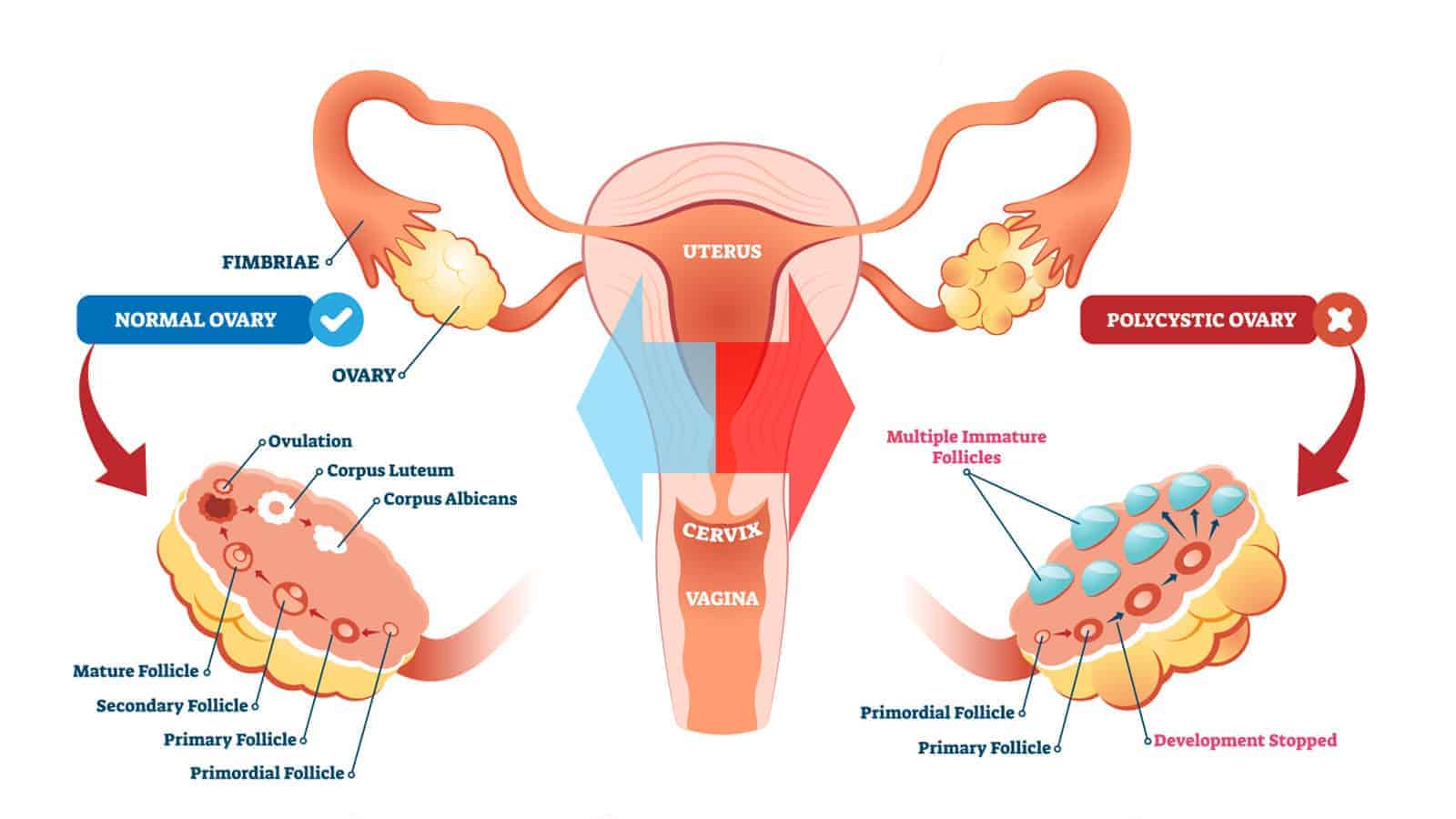Polycystic ovary syndrome, called PCOS for short, is a hormone disorder that affects people with a uterus at reproductive age. It affects approximately 1 in 10 individuals fitting that description, often leading to infertility, obesity, and diabetes.
PCOS causes irregular menstrual cycles, often causing infrequent or extremely light periods. Ovaries may also be unable to release eggs, leading to infertility as it produces numerous follicles – little collections of fluid – instead. Some PCOS patients may also develop cysts in their ovaries, most of which are benign and will rupture or go away on their own, though they can cause a lot of pain.
When left untreated, PCOS can lead to the development of type 2 diabetes, cardiovascular problems, and other issues. Common symptoms of PCOS include severe acne, excess growth of hair, male-pattern baldness in women, and, of course, irregular periods. Doctors often recommend changed diet plans or treatment medication that involves metformin or birth control.
But what do we know about the science behind the hormone imbalance that causes PCOS? How does it work? Why does it happen? How can you stop it from developing?
5 Causes Of PCOS And How You Can Prevent Symptoms In Three Different Ways
PCOS is not a very well-understood disease. Many of its underlying causes are still not known, and most experts say that its exact cause is unknown. Even so, researchers are continually breaking new ground in their study. Here are some of the proposed causes of PCOS, according to science.
1. Genetics
According to very recent research involving almost 30,000 women, genetics may play a part in whether or not you develop PCOS. 3.4% of women whose mothers had PCOS will also be diagnosed with PCOS later in life, while only 0.6% of women whose mothers did not have the disorder will receive this diagnosis.
Though a small difference in risk, it still suggests that there is a link between genetics and PCOS, something which was not fully confirmed or even widely accepted until a few years ago.
2. Inflammation
Low-grade inflammation of a chronic variety links to PCOS – and it connects to many other diseases, too. This issue can stimulate the ovaries to produce additional and excess androgens, leading to PCOS.
Inflammation is a good thing in small doses. It’s why you get fevers, why sore muscles feel like they “burn,” and why cuts sting – it’s your body working hard to fix the problem. But when bad lifestyle choices or other diseases cause repeated, constant inflammation, you are at risk for many conditions.
3. Hormone Imbalance
One of the key features of PCOS is hormonal imbalance. In PCOS, the ovaries begin to produce excess levels of androgens, which are “male” hormones. This condition causes the menstrual cycle and process of egg release to be disrupted.
If you already have a tendency towards hormonal imbalance or you are performing certain lifestyle choices that lead to hormonal imbalance, your risk of PCOS is higher.
4. High Insulin Levels
Your body produces insulin to process sugar and other sources of glucose. When you overeat of it (or you have a disorder that dysregulates insulin), insulin resistance becomes a problem – you start to develop a resistance to insulin, which means that too much is produced.
Higher levels of insulin secretion can lead to higher production of androgens, which causes a hormonal imbalance – and then PCOS.
5. Obesity
Obesity itself isn’t a guarantee for PCOS, but it does increase your risk of all the other factors: insulin levels, hormonal imbalance, chronic inflammation, and more. Plus, it increases your risk for virtually all other diseases, too.
Preventing PCOS Symptoms
Preventing PCOS when it’s in your genetics can be quite tricky, but with certain active lifestyle choices, you can reduce your risk of developing the disease significantly. Here’s what you can do to prevent PCOS.
1. Get All The Nutrients You Need
Nutrient deficiencies – especially of micronutrients – can lead to PCOS. It doesn’t matter what kind of diet you have; if you’re not getting the nutrients you need, you’re going to suffer for it. Here is a list of nutrients to keep in mind:
· Vitamin B12
A deficiency in this vitamin can lead to an increased risk of insulin resistance. It’s even more critical to expectant mothers – a lack raises their risk significantly and can even potentially cause their baby to have an increased risk for developing type 2 diabetes! Unfortunately, many PCOS treatments also lead to deficiencies in B12, so speak to your doctor about regular tests.
· Vitamin D
Many people with PCOS have vitamin D deficiencies – so it doesn’t bode positively for you if you neglect this vitamin. It can cause insulin resistance issues.
· Magnesium
A diet that is rich in magnesium doesn’t just help your body better manage and produce balanced insulin, it can also help to reduce all symptoms of PCOS. This includes mood disorders, fatigue, and even migraines.
· Chromium
This essential mineral has been found to regulate blood glucose and insulin to the point of helping those with diabetes. Studies have also shown a positive link between PCOS and chromium; just 200 mcg was able to reduce insulin and blood sugar in patients with the condition.
· Iron
For most, iron deficiency comes after PCOS as one of its symptoms, but it’s a good idea to make sure you’re consuming enough of it anyway. If you’re deficient, it can make PCOS symptoms worse and possible increase some level of risk.
· Omega-3 Fatty Acids
Omega-3 fatty acids are often cited as a method for reducing the risk of many diseases, and PCOS is one of them. Do note that you shouldn’t opt for dairy fatty acids, as these may increase androgen levels – but oily fish, nuts, seeds, and other similar sources work well.
· Zinc
People who have a deficiency in zinc typically wind up with harmful levels of androgen hormones in the body – and skin problems like acne. And since androgen hormone imbalance can cause PCOS, it makes sense that you’ll want to get enough zinc to combat the risks.
2. Manage Your Physical Health
Lifestyle choices can often contribute to the risk of PCOS. Although it’s never truly your fault that you develop the condition, certain factors can put you more at risk. Here are some tips for managing physical health to prevent PCOS:
· Stress Management
Chronic stress does all sorts of terrible things to your hormonal balance. A lot of this is rooted in the adrenal glands, which are responsible for stress response. Excessive stress can dull their function, preventing them from adequately managing what they’re supposed to, trapping you in a cycle of endless stress!
· Physical Activity
Physical activity can boost your metabolism and help your body use up insulin in a better way. Aim to get a minimum of 150 hours of exercise per week – that’s 30 minutes of activity five days a week, or however, you want to divide it.
· Sleep
You should be getting at least 7 hours of sleep every night. If you aren’t, you’re automatically setting yourself up for increased fatigue throughout the day, which adds to stress. You’re also stopping your body from getting sufficient time to repair itself and rest overnight.
Here are some bonus tips for better stress management:
- Try mindfulness meditation
- Learn to manage time better
- Keep a journal or planner
- Make time for self-care
- Make time for your likes and hobbies
- Listen to music
- Spend time with loved ones
- Chew gum
- Learn to set appropriate boundaries
- Limit your caffeine and alcohol intake
- Find opportunities to laugh
- Light a candle or burn something that has a pleasant smell
- Try deep breathing exercises
Here are some bonus tips for better sleep:
- Activity during the day (but not within three hours of bedtime)
- Reduce alcohol and caffeine intake several hours before bed
- Wind down with a shower, bath, or meditation
- Reduce light exposure at night
- Maintain a consistent sleeping and waking routine
- Don’t eat too late
- Don’t take long or oddly-timed naps
- Make sure your room is a proper temperature
- Make sure your bedding is comfortable
 3. Reduce Certain Foods
3. Reduce Certain Foods
Certain foods can increase symptoms of PCOS in people who already have the disorder, so it’s fair to say that they may also increase PCOS risk in general. Here are some foods you may want to reduce your intake of:
· Dairy
Some studies have pointed to a link between dairy and PCOS, which is why many doctors feel like a positive step is reducing dairy intake. Specific dairy options can increase the production of androgen in the body and worsen acne.
However, as there is no concrete evidence that this works yet, you can try reducing your intake for a month and seeing how you feel. Do note that low-fat dairy options often have worse effects than full-fat ones.
· Caffeine
Research has suggested that consuming caffeine causes changes to levels of the hormone estrogen, as well as changes to the behavior of hormones in general. This imbalance can increase your risk of PCOS.
If you need caffeine, you can try drinking green tea – which has other benefits, including for immunity, positive thinking, and overall health. Decaf options, including herbal tea, are still the most beneficial, though.
· Wheat and Grain
Diets high in foods based on grains can be harmful to people with a risk of PCOS. This is because they can often bind crucial nutrients together, including magnesium, zinc, and vitamin D.
Why does this happen? Well, many carbohydrates of this variety have phytic acid, a substance that binds minerals together, making them difficult – if not nearly impossible – for your body to absorb.
 Final Thoughts On Some Causes Of PCOS And How You Can Prevent Symptoms
Final Thoughts On Some Causes Of PCOS And How You Can Prevent Symptoms
PCOS can be a challenging condition to manage, but you can take steps that focus on your diet and lifestyle to reduce your risk. If you are obese, diabetic or pre-diabetic, or deficient in specific vitamins, you’ll be at higher risk.
If you are experiencing irregular periods, you should speak to a doctor to find out if you have a hormone imbalance. Even if you don’t have PCOS, there are many other reasons you may be experiencing odd menstrual cycles. If your mother or other family members have PCOS, you should be extra careful. Be aware of your risks!

















